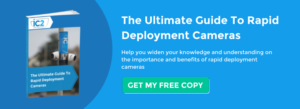Covert or overt CCTV? the pros and cons of both

There are advantages and disadvantages to both covert and overt CCTV systems. This article will explore the pros and cons of each type of device to help you make the best decision for your organisation’s security requirements.
Overt CCTV cameras
Overt CCTV systems are visible and are known to be in operation. The cameras are typically mounted in plain sight strategic locations and are clearly labelled. The main advantage of overt CCTV is that it acts as a deterrent to crime. Potential criminals are often less likely to commit a crime if they know they are being watched. On the other hand, the primary disadvantage of overt CCTV is that it can make customers, members of the public, and employees feel like they are being constantly watched, which can lead to feelings of anxiety and mistrust.
Advantages
- Can act as a visual deterrent
- Can be used for investigative purposes if an incident occurs
- Can help with health and safety compliance
- More affordable than covert CCTV
- Easier to install
Disadvantages
- May require planning permission
- Can be vandalised
- Can give burglars and other criminals time to plan their attack/getaway
- Not always effective as a deterrent
- People may find obvious surveillance intrusive and uncomfortable
- Not always reliable (e.g. poor lighting, damage to cameras)
Covert/hidden CCTV
Hidden or covert CCTV systems are not visible and are intentionally hidden to disguise their nature. The devices may be obscured behind other objects or disguised as items such as smoke detectors or exit signs. The main benefit of hidden CCTV is that it can be used to collect candid evidence without the subject’s knowledge. This is considered to be deceitful or dishonest by many people, but can be useful in business situations where you suspect employee theft or fraud, or in areas where openly displayed CCTV may not be appropriate (e.g. in bars, nightclubs, and entertainment venues).
Another advantage of hidden CCTV is that it does not openly invade personal privacy to the same extent as overt CCTV. Employees, customers, and members of the public are less likely to feel like they are being invasively watched if they do not know where the cameras are located.
However, hidden CCTV can be controversial, and in a business context it may prove difficult to get employees on board with a system that could imply that they are not trusted by their employers.
Advantages
- Does not require planning permission (as long as it’s not in a public space)
- Gives criminals no warning that they’re being watched
- More effective at catching criminals in the act
Disadvantages
- Can be more expensive than overt CCTV
- More difficult to install
- Not always easy to hide or disguise
- Not always effective (e.g., if criminals know where hidden cameras are located, they can avoid them)
Are covert CCTV cameras legal?
Yes – however, in the UK, the use of both covert and overt CCTV systems is governed by the Data Protection Act 2018 and the stipulations of the General Data Protection Regulation (GDPR). Organisations must adhere to these regulations when using any CCTV hardware to monitor employees, customers or the general public.
If you have a CCTV system in your workplace, it is important to make sure that employees are aware of its purpose and how it will be used. You should also have a clear data management and retention policy in place so that employees and customers know how long their data will be stored for.
Making the right choice for your business
So, what’s the best choice for your organisation – covert or overt CCTV? The answer depends on your specific needs and circumstances. If you want a highly visual deterrent, then overt CCTV is probably your best option. If you need to catch criminals in the act or collect evidence after an incident has occurred, then hidden cameras may be a better solution.
Our team of experienced commercial security specialists are available to help you make the best investment for your organisation and that best suits the needs of your employees and customers. Please call us today in confidence on +44 20 3747 1800 to find out more.
Written by Paul Carter on December 21, 2022 10:00 am

.png)

Recent Comments